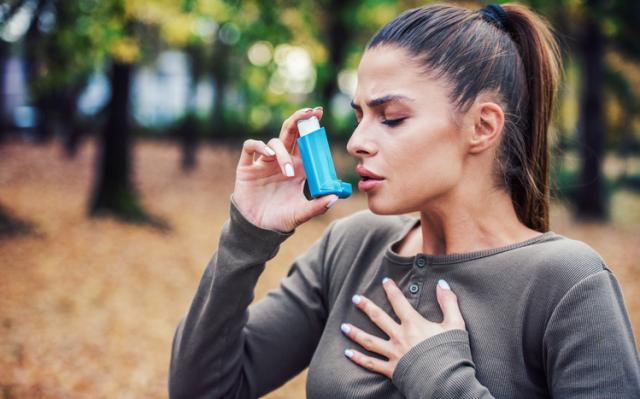“Asthma can be diagnosed at any age, and symptoms and triggers vary by person,” said Sherissa Charles, MD, Catholic Health Family Medicine Physician. “If you live with asthma or think you may have asthma, talking to your doctor about your symptoms and triggers will help you find the care you need.”
What is asthma?
Asthma is a chronic inflammatory lung disease that affects your breathing. It causes inflammation and obstruction of the bronchial tubes, which allow air to enter and leave your lungs.
What are the symptoms of an asthma attack?
An asthma attack happens when the muscles around your airways tighten, called a bronchospasm. The lining of your airways becomes inflamed and fills with mucus.
People with asthma may have one or more symptoms during an asthma attack, including:
- Breathing difficulties
- Shortness of breath
- Rapid breathing
- Tightness in the chest
- Wheezing
- Persistent coughing, especially in the morning or evening
- Difficulty talking
- Feeling anxious or panicked
How long do asthma attacks last?
“The duration of an asthma attack varies depending on the triggers and the level of inflammation in the airways,” said Dr. Charles.
A mild attack is most common. The airways typically open within a few minutes to a few hours if treated with treatment such as a quick-action inhaler.
A severe asthma attack is less common. The attack has severe symptoms, such as worsening coughing or shortness of breath and blue lips or fingertips. Emergency medical treatment is required. Call 9-1-1 immediately.
What are asthma attack triggers?
Allergen exposure, including pollen, dust mites, mold and animal dander.
Air irritants, including strong odors, perfume, smoke or chemical fumes.
Extreme weather, including a humid, hot summer day, a spring day with high pollen, or a frigid winter day.
Certain illnesses, including flu, sinusitis and a mild upper respiratory infection.
Strenuous exercise. Talk to your doctor before beginning a new exercise program that may worsen asthma symptoms.
Stress and anxiety. Changes in emotions and mood can alter normal breathing patterns.
How is asthma diagnosed?
“If you or your child are showing signs of asthma, schedule an appointment with your doctor for evaluation,” said Dr. Charles. “Diagnosing asthma involves several steps, and may involve multiple appointments for testing and definitive diagnosis."
Your doctor will guide you on age-appropriate, safe, and accurate testing for children who may have asthma.
Review of symptoms and medical history
You and your doctor will discuss:
- What are your symptoms?
- How frequently do they occur?
- Do you have triggers like the time of day, certain weather conditions and physical activity?
- Are you exposed to pollutants where you live or work?
- Do you have existing health conditions that can occur with asthma or worsen asthma symptoms? Such as:
- Allergies (hay fever)
- Sinusitis
- Gastroesophageal reflux disease (GERD)
- Do you have family members, such as a parent or grandparent, with asthma?
- Do you have a history of recurring respiratory viruses or bronchitis?
Physical exam
Your doctor will listen to your breathing (exhaling/inhaling) and examine your nose, throat, and upper airways.
Testing
A lung function test is the most common way to test for asthma. A spirometer is connected to a tube that measures the amount and speed of the air you exhale. Your results will be measured against the average for your age. If below average, you may have narrowed airways that indicate asthma.
If your spirometry results are typical, your doctor may recommend a challenge test that triggers asthma symptoms by having you breathe in methacholine, which narrows the airways. If your asthma is triggered by exercise, you may be asked to do monitored physical activity.
Your doctor may also order blood tests or skin tests.
How is asthma treated?
"Your primary care physician can oversee asthma treatment," said Dr. Charles. "However, they will often coordinate your care with an allergist or pulmonologist to help guide management as needed. You will work together to develop an asthma action plan and ensure age-appropriate treatment."
The goals of an asthma treatment plan include:
- Managing symptoms and triggers of an attack.
- Finding the proper medication to treat an attack.
- Learning how to decrease the frequency of an attack.
Specific treatments may include:
Quick-relief medication. Your doctor will prescribe a quick-relief inhaler you can use daily and may also prescribe an additional as-needed inhaler that quickly reduces airway inflammation during an asthma attack. Follow the instructions as specified.
A peak flow meter. This breathing device monitors how well your lungs work, letting your doctor know if your medication needs to be adjusted.
Breathing exercises. Regulating your breath, especially when stressed or anxious, can help to avoid an asthma attack.
Routine doctor visits. Your primary care physician (PCP) and asthma specialist will review your asthma action plan and make changes if you are experiencing new or worsening symptoms.
“Asthma is manageable and does not need to interfere with daily activities,” said Dr. Charles. “Routinely checking in with your doctor will ensure your treatment plan works.”







